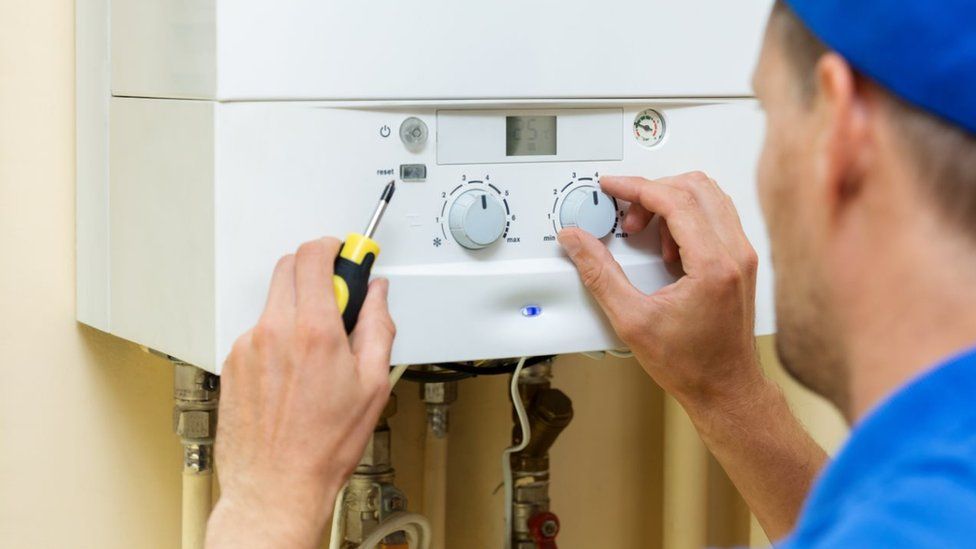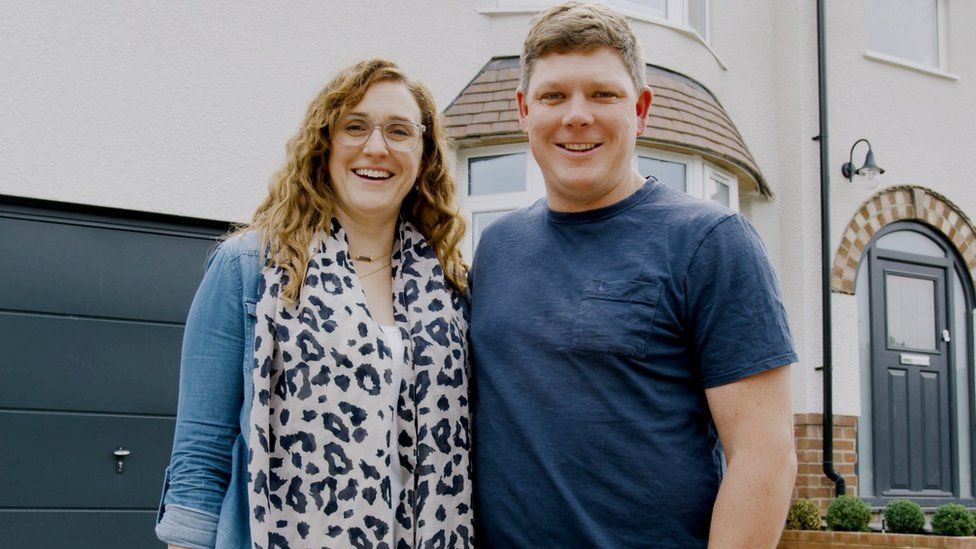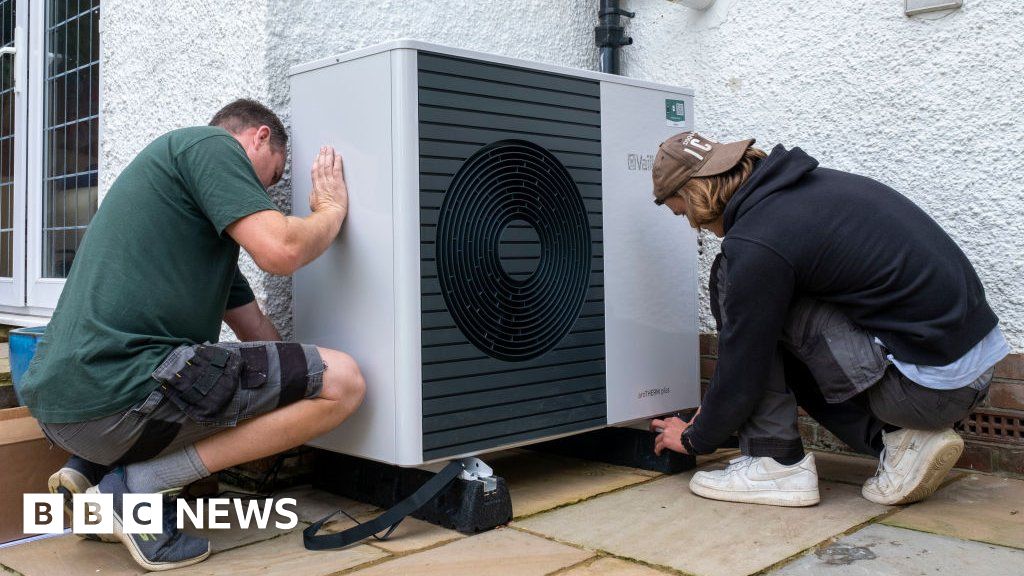
Homeowners in England and Wales will be offered subsidies of £5,000 from next April to help them to replace old gas boilers with low-carbon heat pumps.
Up to 25 million UK homes are heated by gas boilers, but the grants will fund just 90,000 pumps over three years.
Although the government says it wants no new gas boilers to be sold after 2035, it has not banned them outright.
Experts have criticised the plans as unambitious, but the government says it will boost demand for heat pumps.
While homeowners will be encouraged to switch to a heat pump or other low-carbon technology when their current boiler needs replacing, there is no requirement to remove boilers that are still working, the government emphasised.
Writing in the Sun, Prime Minister Boris Johnson said: “The Greenshirts of the Boiler Police are not going to kick in your door with their sandal-clad feet and seize, at carrot-point, your trusty old combi.”
An air-source heat pump costs between £6,000 and £18,000, depending on the type installed and the size of a property.
Ministers say the subsidies will make heat pumps a comparable price to a new gas boiler. However, the £450m being allocated for the subsidies over three years has been criticised as insufficient.
Experts also point to the need for costly new insulation and other home improvements to help households get the best out of the switch.
More resources
“Gas is in the news for price increases that are on the horizon,” said Dr David Glew, head of energy efficiency and policy at the Leeds Sustainability Institute at Leeds Beckett University.
“But gas is actually relatively cheap to heat your home with,” he added.
“Needing to insulate your house might cost you tens of thousands of pounds and you’re only going to be saving several hundreds of pounds, so the economics of that doesn’t really add up.”
Mike Childs, head of science at Friends of the Earth, said the number of heat pumps that the grants would cover “just isn’t very much” and meant the UK would not meet its climate targets.
“These grants will only incentivise the best-off households,” he said.
Greenpeace UK’s climate campaigner, Caroline Jones, said the government needed to provide more money to speed up the switch.
“A clearer signal would have been a phase-out of new boilers before 2035,” she said.
Jonny Marshall, senior economist the Resolution Foundation, a think tank focusing on poverty, said the UK would struggle to meet its goal of cutting emissions from homes in half by 2035.
The UK has committed to reduce its greenhouse gas emissions to net zero by 2050.
But a group of experts that advises the government says Boris Johnson’s government has credible policies in place to deliver only about a fifth of this cut.

‘It’s been worth the bother’

Helen Selman lives with her husband and two children in Chippenham. When they moved into a 1930s semi, they knew they wanted to undertake home improvements, an upgrade to the heating system and an extension.
“It was not cheap,” she said. “But because we were doing everything else, and because this was going to be our forever home, it made sense.”
Helen chose an air-source heat pump but alongside it, they had a specifically designed insulation upgrade, new radiators and brand new underfloor heating.
“With a heat pump, the problem is that you have to make sure that your house is as well insulated as possible,” she explained. “We already had double or triple-glazing, we had insulated walls, we were upgrading the lofts.”
To help with the project, Helen and her family used the old Renewable Heat Initiative funding: “The RHI money will pay back quarterly over seven years and will go quite a long way to covering the costs.”
She said: “It’s been definitely worth the bother.”
But she admitted that without their own plans to extend and the added bonus of government cash, it might not have happened. “Without an incentive, there are few people who have the cashflow or the passion to do this,” she said.

Heating buildings accounts for more than a fifth of the UK’s overall greenhouse gas emissions, so there is pressure on the government’s Heat and Buildings Strategy to deliver effective reductions.
Business and Energy Secretary Kwasi Kwarteng said the grants to support the adoption of heat pumps, available from next April, would help to bring down the cost of the relatively new technology by 2030.

What is a heat pump and how much will one cost me?

Heat pumps extract warmth from the air, the ground or water – a bit like a fridge operating in reverse.
They are powered by electricity, so if you have a low-carbon source of electricity, they provide greener heating.
One energy firm, Octopus Energy, said it expected homeowners to pay about £2,500 to the cost of installing a heat pump, roughly equivalent to the cost of a new gas boiler. The government subsidy would cover the rest.
But many houses will require an upgrade to their energy efficiency, including insulation, before installing one.

In total £3.9bn funding is being provided, with most of that invested in decarbonising public buildings, insulating and installing new heating systems in social housing and for those on low incomes, and helping to provide clean heating networks for homes that are unsuitable for heat pumps.
The plan also includes:
- £3.45bn to decarbonise buildings in England and Wales including social housing and district heating schemes
- £60m to drive technological innovation to develop clean heating systems that are smaller, easier to install and cheaper to run. This money will come from a previously announced innovation fund
Independent climate think tank E3G said that setting the phase-out date for new fossil fuel boilers was “a world-leading achievement” and the pledge to reduce heat pump costs by 2030 was to be welcomed.
However, the funding was insufficient to achieve the government’s goals on reducing emissions, programme leader Pedro Guertler said.
“On energy efficiency alone, the public investment announced today falls £2bn short of what was pledged in the Conservative manifesto to 2025,” he said.
Ed Miliband, the shadow business secretary, described the strategy as “meagre, unambitious and wholly inadequate”, adding that Labour had pledged to spend £6bn a year on insulation and low carbon heating.
The Liberal Democrats described the heating plan as “a kick in the teeth for families across the country facing soaring energy bills this winter”.


It’s another piece in the Boris Johnson climate-calming jigsaw.
First, he slots in a world-leading policy halting the sale of petrol cars by 2030.
Now he lays down another piece – no new gas boilers after 2035. It’s another trend-setting initiative that other nations will surely follow.
There’s a problem, though. Because by that date in the middle of the next decade, the PM has already pledged to cut emissions overall by 78% over 1990 levels.
Energy experts say that simply won’t happen unless he provides much wider incentives for people to insulate their homes and to buy heat pumps to replace their gas boilers.
One group of researchers estimates that to meet his net zero targets he needs to invest nearly another £10bn over three years.
They hope the chancellor will fill that piece of the jigsaw in his spending review next week.

Industry sources welcomed the new strategy.
The Confederation of British Industry said it would help members prepare for the changes ahead, but its chief policy director, Matthew Fell, called for “a clear delivery plan for consumers, businesses and local authorities”.
Scottish Power’s chief executive, Keith Anderson, said it would kick-start demand for electric heating, “allowing the industry to accelerate the delivery of electrification and quickly bring down upfront costs”.

- THE MATING GAME: When the survival of the species depends on you…
- BREAKING DOWN BARRIERS AND LEADING THE WAY: The pioneers who became legends

